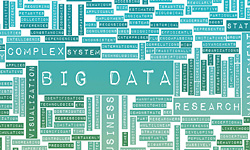Big-Data Adoption: Avoiding Analysis Paralysis April 2016
Want more free featured content?
Subscribe to Insights in Brief

Longitude Research conducted a recent survey about executive decision-making in which 36% of respondents said that their organizations were not coping with information overload, and 32% said that big data had made things worse rather than better (36% thought that big data improved things, and the remainder were neutral). Longitude Research surveyed 300 C-level executives across 16 countries on behalf of a joint venture between the American Institute of Certified Public Accountants and the Chartered Institute of Management Accountants.
Some respondents to the survey identified a disconnect between data analysis and practical decision-making. In the survey report, Claire Suddens-Spiers of Rothschild says, "People can slice and dice data in so many ways, but sometimes it adds to the white noise and gives lots of people a channel to ask irrelevant questions because they are not close enough to the real business."
The Longitude Research survey report does say that big data offers a "significant opportunity" to those who can "gain greater mastery" of the technology. The report also notes that organizations that are "integrated thinkers" are adept at aligning the application of data with enterprise strategy.
Another recent survey, this one by big-data consulting firm NewVantage Partners, suggests that big data has gone mainstream, at least within the financial services firms that employ the survey's respondents. 62.5% of respondents said they had big-data initiatives in production in 2015 in comparison with 48.2% in 2014 and 31.4% in 2013 (in early versions of the same survey). Notably, respondents said that variety was by far the biggest driver of big-data investments rather than volume or velocity. NewVantage surveyed respondents from 44 organizations and concentrated on executives with data-related roles such as Chief Data Officers and Chief Information Officers. NewVantage describes the survey as "anecdotal" rather than scientific.
Implications
Longitude Research's survey suggests that many organizations are still struggling to realize the benefits of big data and that many (perhaps about a third) feel overwhelmed by the data and data-related technologies they deal with. The insight that organizations and individuals can become lost in endless data explorations without clear goals is also important. Suddens-Spiers terms this phenomenon "analysis paralysis."
Impacts/Disruptions
The benefits of big data are unevenly distributed. Some organizations (and some sectors) have harnessed data and systems to drive decision-making far more effectively than others have done. Longitude Research surveyed a general audience and found that only the high-performing minority ("integrated thinkers") have solved the problem of aligning data applications with strategy. NewVantage surveyed a data-focused group and found (perhaps unsurprisingly) rapid growth in big-data use within this group.
These surveys are a reminder that technology and "data for data's sake" are not enough—organizations need data, tools, and applications that meet real business needs, and they need cultures and processes that turn big-data insights into real actions that deliver value.